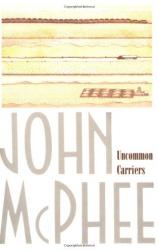Uncommon Carriers
Review
Uncommon Carriers
Each new book from John McPhee challenges bookbuyers' preconceptions of what subjects they presumably would choose not to read about --- birchbark canoes, shad, geology, freight transportation. But his readers --- in particular those whose encounters with McPhee are intentional, those who buy his books and watch for his name in The New Yorker --- know that whatever his subject happens to be, they will find it thoroughly fascinating.
It wouldn't be quite right to say that he makes his subjects fascinating; rather, he, too, finds them fascinating. One of the secrets of outstanding reporters like McPhee is a deep, unfeigned interest in the things they write about. And one of McPhee's own "secrets" is the inclusion of interesting people (other than himself) who are closely involved with the things in some manner.
These people are often eccentric or idiosyncratic --- in a word, colorful --- and the ones in this book are made more so by the rigors of their jobs. The most rigorous of this collection is probably piloting the towboat Billy Joe Boling, which is longer than any ocean liner ever built and 44 feet longer than any existing aircraft carrier. On the occasion of McPhee's visit, the BJB is pushing a string of 15 barges, more than a thousand feet ahead of the pilothouse --- a backseat driver's worst nightmare. Adams's mate takes up a position at the head of the barges and sends reports by radiophone to keep the man at the wheel informed of where they are in relation to the channel and to the supporting piers of the numerous bridges under which they pass.
In "A Fleet of One," McPhee recounts riding with Don Ainsworth in his 65-foot chemical tanker in the mountains of eastern Oregon. Ainsworth conforms to type in his contempt for "four-wheelers," meaning conventional automobiles, whose operators so often overestimate the truckers' ability to slow down enough to avoid running over them when they emerge in an untimely fashion from an access-ramp. But he also applies the term to other trucks having fewer than 18 wheels.
McPhee asks a few questions he knows readers would pose, such as the sorts of things Ainsworth sees in his aerial view of four-wheelers. Mostly, though, in these New Yorker pieces he exists only outside the frame, like a videographer or an author who has no role in the stories he writes.
After "falling down" disconcertingly steep Cabbage Hill, McPhee turns his attention to the lush valleys lying before them as they conquer each ridge and through which they pass after each descent. But this seeming "interruption" isn't simply a whim of the writer. In fact, it is essential in setting up Ainsworth's final comment, which closes the first section of "A Fleet of One." Here, following McPhee's comment on the natural beauty, is the final line: "Listening to his engine climb, Ainsworth called it 'operatic.'" Put simply, Ainsworth is too absorbed with his truck to notice. Thus does the writer gently prepare his readers for the next section, in which they will learn about the physical side of Ainsworth's relationship with his truck.
In this section, when it's time for The Washing of the Truck, Ainsworth suddenly morphs from the king of the road into Adrian Monk. It simply isn't enough to say that Ainsworth is vain about his truck. Vanity alone doesn't fully explain his wearing T-shirts with his truck's picture on them and his insistence on having it washed only at places that use either reverse-osmosis or deionized rinse water. "This is as close as a man will ever know what it feels like to be a really gorgeous woman," he remarks as they drive away from the truck wash.
Soon afterward comes another example of McPhee's art:
Crossing the summit of the Laramie Range and addressing the western side, he geared down from twelfth to eighth and said, "I won't use one ounce of brake pressure. The jake is on maxi." As big trucks flew past us --- dry boxes, reefers --- he said, "These guys using brakes with improper gear selection don't own the tractor or the trailer. Using brakes costs money, but why would they care?" ... As he glided onto the Laramie Plains, he went back up to eighteenth gear: the going-home gear.... On a grade at Hot Lake, however, he tried fifteenth gear, and his foot had to graze the pedal. He seemed annoyed with himself, like a professional golfer who had chosen the wrong club.
It probably should be said that whether a reader notices such things or not, the half-dozen picked-up pieces in UNCOMMON CARRIERS nonetheless are enjoyable, for McPhee is above all a superb reporter with a keen eye for detail and a gifted storyteller whose art never intrudes on the telling.
Reviewed by Harold Cordry on January 24, 2011
Uncommon Carriers
- Publication Date: April 3, 2007
- Genres: Literature, Nonfiction
- Paperback: 256 pages
- Publisher: Farrar, Straus and Giroux
- ISBN-10: 0865477396
- ISBN-13: 9780865477391




